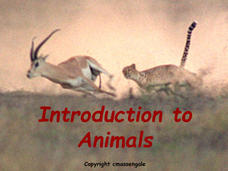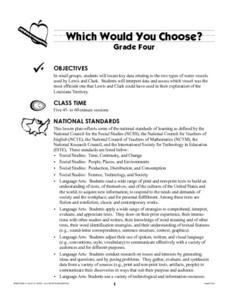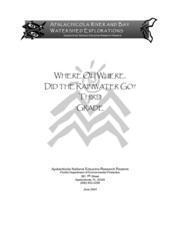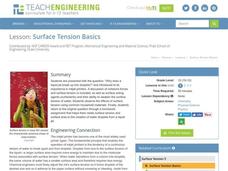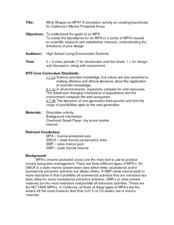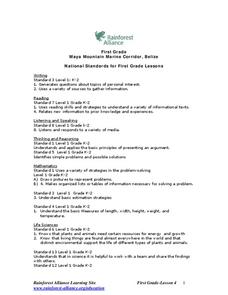Curated OER
Water Conservation
Students explore types of water reserves. In this water conservation lesson, students brainstorm ways water are used in their homes. Students use a graduated cylinder to simulate the amount of water on Earth and the amount that humans use.
Chymist
Testing the Waters
Should you trust the water you drink every day? The hands-on activity has scholars test water from different sources for contaminants. Pupils perform chemical testing and make conclusions about pH, hardness, iron, chlorine, lead, and...
Marine Institute
Water Pollution
Sixth graders investigate the various types of pollutants found in water and ways to help prevent water pollution. Through a hands-on experiment, young scholars create samples of polluted water by mixing water with vegetable oil, dirt,...
Chymist
The Solubility of a Salt in Water at Various Temperatures
An educational activity allows young chemists to test the solubility of different types of salt at various temperatures. Groups create a graph using data from unsaturated, saturated, and supersaturated solutions.
Curated OER
Modeling an Oil Reserve
Students conduct an experiment. For this oil and natural gas lesson, students learn how geoscientists identify and explore reserves of petroleum. Students make a model of an oil reserve, record how much it would cost to drill for oil...
Curated OER
Soil and Water Conservation Merit Badge Workbook
In this soil and water conservation Boy Scout merit badge worksheet, students complete 5 pages of multiple step, short answer questions about soil and how to conserve it. They list different types of soil, plant nutrients, and define...
Curated OER
Clean Water vs. Dirty Water
Students study the importance of clean water to the survival of organisms and what activiities and material pollute water. They measure the temperature of water samples and create a class graph.
Biology Junction
Introduction to Animals
Out of all animals, elephants alone lack the ability to jump. Scholars learn all about animals using a presentation full of fun examples. It describes different types of animals, the biological similarities and differences between...
Baylor College
Needs of Plants
What better way to learn about plant life than by creating a class garden? Young botanists start with a brief discussion about radishes before planting seeds and watching them grow. To determine the importance of water, sunlight, and...
Curated OER
Which Would You Choose?
Fourth graders investigate two types of water vessels that were used by Lewis and Clark during the exploration of the Louisiana Territory. They interpret data to determine which vessel was more efficient.
Curated OER
How Much Water Do Plants Need?
Students experiment with the effects of varying amounts of water on household plants. They give different amounts of water to plants and then observe and record the effects.
Curated OER
Where Oh Where Did the Rainwater Go?
Third graders conduct an experiment to determine how water moves through different soils found in the Apalachicola River watershed. They read a scenario, conduct the experiment, answer follow-up questions, and draw the water movement...
Teach Engineering
Surface Tension Basics
Back to the basics (of surface tension). The first installment of a nine-part series teaches young scholars about the basics of surface tension and how it relates to water droplets. They also learn how this concept allows for the...
Read Works
We Need Freshwater
Why do we need freshwater? Because freshwater sustains life. After reading a three-paragraph passage about the importance of freshwater, first graders respond to the article by answering comprehension questions. The resource includes...
Curated OER
Six Types of Reactions
In this types of chemical reactions worksheet, students fill in 5 blanks with the proper type of chemical reaction described in the sentence. Students balance 5 equations and identify the type of chemical reaction for each equation.
PBS
Cloud Clues
It's cloudy with a good chance of learning! An inquiry-based lesson begins with an exploration of transparent, translucent, and opaque materials. Young scientists then connect their learning to the different cloud types as they take the...
Curated OER
Cloud Viewer
Fourth graders examine different types of clouds. In this cloud instructional activity, 4th graders examine pictures of different types of clouds and read details about them in the captions under the images. They make a cloud viewer by...
Curated OER
To Spread or Not to Spread
Students explore the difference between the three types of contrails. In this contrails instructional activity, students make observations of contrails and record them. Students identify the three types of contrails and complete an...
Curated OER
Types of Chemical Reactions
In this chemical reactions worksheet, students fill in 12 blanks, determine if 5 statements are true or false, match 4 types of reactions with their description and solve 2 problems related to balancing equations and chemical reactions.
Curated OER
What Shapes a MPA?
Young scholars identify the three types of MPA in California. In this marine science lesson, students analyze information provided to design a new MPA. They justify their reasoning in class.
Curated OER
Fieldwork: Horizons Under Ground: Digging Through Wetland Soil
Young scholars study the different soil types and describe the different soils in various environments. In this soil lesson students walk to a reserve and discuss what they saw.
Curated OER
Wetland Plant Detectives
Sixth graders identify plants in the wetlands. In this plant detectives instructional activity, 6th graders complete a scavenger hunt on a local reserve, record observations, and respond in their journals.
Curated OER
Who Takes Care of the Maya Forest Corridor?
First graders study the animals in the Maya Forest Reserve. In this conservation instructional activity, 1st graders create a graph to compare the environment of animals to their own. They design a 3D model of these two environments.
Curated OER
How Can Renewable Energy Be Used?
In this renewable energy worksheet, students will write in details about the 4 types of renewable energy sources: solar, wind, moving water, and nuclear energy. This worksheet is a graphic organizer.









